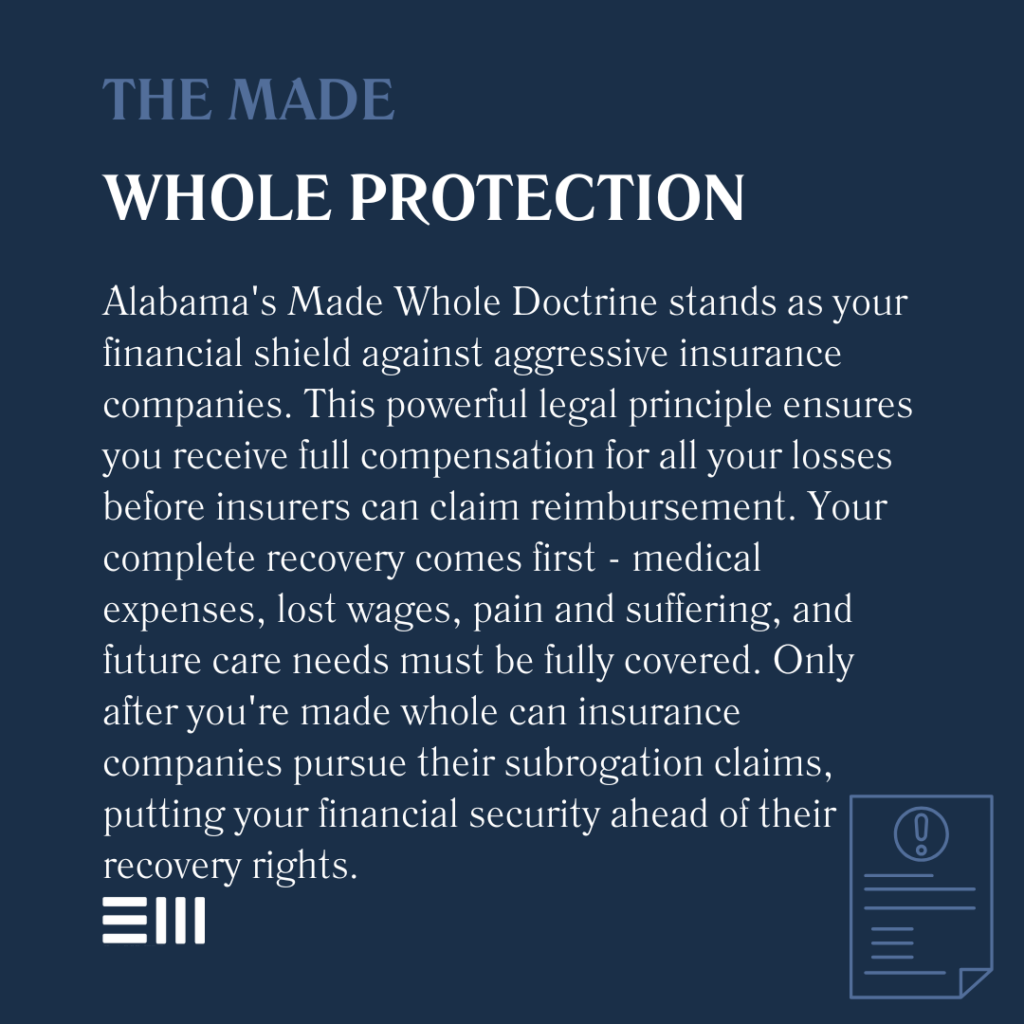
You’ve endured months of recovery, fought for a fair settlement, and finally received your compensation check—only to discover your health insurance company wants a sizeable portion of it back.
The legal principle they’re wielding is called subrogation, and it transforms your long-awaited victory into an unexpected battle over who really owns your settlement money.
But hidden in the fine print of insurance contracts and state laws lie powerful tools to protect your compensation.
Understanding Subrogation Rights
When multiple insurance companies become involved in an injury claim, complex legal relationships emerge that can significantly impact your final compensation.
The decisions you make in these early stages can protect or compromise your settlement.
Types of Subrogation Claims
Insurance companies pursue subrogation in various contexts, each with unique implications for your case:
- Health insurance seeking reimbursement for medical treatment;
- Auto insurance recovering property damage payments;
- Workers’ compensation carriers claiming accident-related benefits;
- Medicare and Medicaid asserting statutory rights; and
- Short-term disability providers requesting repayment.
Understanding these distinctions helps you anticipate and prepare for potential claims against your settlement.
Your Rights Under Alabama Law
Alabama’s approach to subrogation balances insurance companies’ recovery rights with injury victims’ interests.
Several key principles shape these interactions.
Made Whole Doctrine
The Made Whole Doctrine serves as a fundamental protection for injury victims in Alabama:
- Requires full compensation before subrogation;
- Considers all damages, including pain and suffering;
- Accounts for uncompensated future expenses;
- Factors in attorney fees and costs; and
- Evaluates settlement adequacy.
This doctrine often provides powerful leverage in subrogation negotiations.

Contractual Rights and Limitations
Insurance policies contain specific language regarding subrogation rights:
- Notice requirements;
- Cooperation clauses;
- Recovery limitations;
- Settlement restrictions; and
- Dispute resolution procedures.
Careful review of these provisions reveals opportunities to protect your interests.
Negotiating with Subrogation Claims
Successful navigation of subrogation claims requires strategic negotiation and thorough documentation. Understanding common approaches helps maximize your retained settlement.
Documentation Requirements
Proper documentation strengthens your negotiating position:
- Complete medical records;
- Payment histories;
- Insurance correspondence;
- Settlement documents;
- Injury-related expenses; and
- Future care needs.
These records support arguments for reducing subrogation claims.
Negotiation Strategies
Several approaches can help reduce subrogation demands:
- Arguing partial recovery limitations;
- Applying made whole doctrine;
- Disputing causation connections;
- Challenging calculation methods;
- Proposing proportional reductions; and
- Requesting hardship waivers.
Each strategy requires careful evaluation of your specific circumstances.
Medicare and Medicaid Considerations
Government healthcare programs present unique subrogation challenges. Special rules and procedures apply to these claims.
Medicare Secondary Payer Rules
Medicare’s recovery rights carry significant implications:
- Mandatory reporting requirements;
- Conditional payment provisions;
- Future medical set-asides;
- Recovery thresholds; and
- Appeal procedures.
Compliance with these rules prevents future complications.
Medicaid Recovery Rights
Medicaid programs maintain distinct recovery rights:
- State-specific regulations;
- Federal limitations;
- Income-based considerations;
- Hardship exceptions; and
- Administrative procedures.
Understanding these differences guides appropriate response strategies.
Frequently Asked Questions About Subrogation in Alabama
Subrogation raises complex questions about rights and responsibilities for those affected in Alabama.
Here are answers to common concerns.
How Does Subrogation Affect My Settlement?
Subrogation claims can significantly reduce your net recovery, making it essential to address them early in the settlement process.
Can I Negotiate Subrogation Claims?
Most subrogation claims are negotiable, particularly when settlement amounts are limited or injuries are severe.
What if I Already Spent the Settlement Money?
Spending settlement funds doesn’t eliminate subrogation rights, but it may affect repayment arrangements.
Does Health Insurance Always Have Subrogation Rights?
Subrogation rights depend on policy language and state law, with some plans having limited or no recovery rights.
How Do Attorney Fees Impact Subrogation?
Many courts require subrogation claims to be reduced for attorney fees under the common fund doctrine.
Protecting Your Future Care
Strategic handling of subrogation claims preserves resources for your ongoing medical needs and future security:
- Evaluating future care requirements;
- Structuring settlements appropriately;
- Protecting government benefits;
- Planning for long-term expenses; and
- Maintaining healthcare coverage.
These considerations ensure comprehensive protection of your interests.
Common Mistakes to Avoid
The complexity of subrogation law creates numerous pitfalls for the unwary. Understanding these common errors helps protect your interests.
Settlement Language Issues
The specific wording in settlement agreements can dramatically impact subrogation rights:
- Failing to address subrogation claims explicitly;
- Using broad release language;
- Overlooking allocation requirements;
- Ignoring notice obligations; and
- Missing documentation requirements.
Careful attention to settlement terms prevents future complications and protects your interests.
Communication Errors
Poor communication often compromises subrogation defenses:
- Providing recorded statements;
- Making informal agreements;
- Failing to document conversations;
- Missing response deadlines; and
- Overlooking written notice requirements.
Maintaining clear, documented communication channels protects your rights throughout the process.

Third-Party Recovery Rights
When multiple parties share responsibility for an accident, complex recovery rights emerge:
Workers’ Compensation Interactions
Workers’ compensation carriers maintain unique subrogation rights:
- Statutory recovery provisions;
- Limited settlement authority;
- Mandatory approval requirements;
- Offset calculations; and
- Future benefit implications.
Understanding these distinctions helps coordinate benefits effectively.
Multiple Insurance Policies
Cases involving multiple insurance policies require careful coordination:
- Priority of recovery;
- Proportional reimbursement;
- Coverage overlaps;
- Deductible implications; and
- Coordination of benefits.
Strategic handling of multiple claims maximizes your retained recovery.
Impact on Future Benefits
Subrogation decisions can affect your future insurance benefits and healthcare access:
Coverage Continuation
Maintaining ongoing insurance coverage requires careful consideration:
- Network provider relationships;
- Premium implications;
- Policy renewal rights;
- Coverage exclusions; and
- Benefit coordination.
These factors influence long-term healthcare access and costs.
Government Benefit Eligibility
Subrogation settlements may affect eligibility for government programs:
- Medicare qualification;
- Medicaid eligibility;
- Social Security benefits;
- Veterans benefits; and
- Disability programs.
Proper planning preserves access to essential benefits.
Working with Legal Counsel
Professional guidance often proves invaluable in subrogation matters.
When to Seek Help
Consider legal representation when facing:
- Multiple subrogation claims;
- Government recovery rights;
- Complex settlement structures;
- Coverage disputes; and
- Benefit coordination issues.
Early intervention often produces better outcomes.
Documentation Requirements
Effective representation requires comprehensive documentation:
- Insurance policies;
- Medical records;
- Payment histories;
- Correspondence records; and
- Settlement documents.
Maintaining organized records strengthens your position.
Secure Your Settlement Rights Now
Don’t let subrogation claims consume your hard-won compensation.
Our experienced attorneys understand the complexities of insurance recovery rights and can help protect your interests.
Contact us today for a free consultation to discuss your options and develop a strategy for maximizing your retained settlement.
Can't find what you're looking for? Search our site below.










